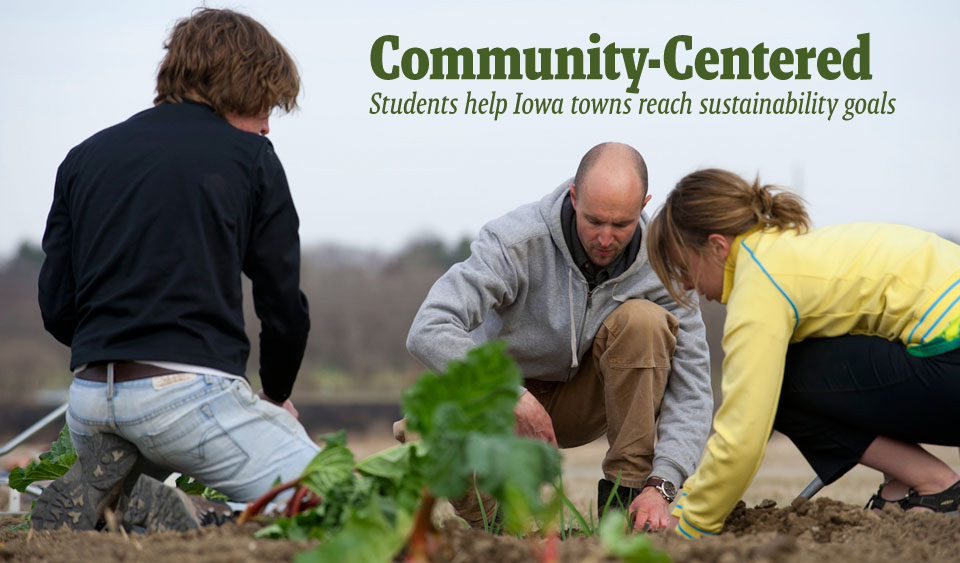-
Page Navigation Links:
- Skip to Site Navigation Links
- Skip to Features

- The University of Iowa
- Spectator
- Monthly News for UI Alumni and Friends
Students in the University of Iowa School of Urban and Regional Planning have been putting theory into practice—and Iowa communities have been reaping the rewards.
Over the last two academic years, student groups in the Graduate College program have worked on a variety of projects with seven small towns in Iowa. This year, Burlington is developing a plan to revitalize historic downtown properties. Charles City is using the proximity of the Cedar River to redesign its downtown as a recreational destination. Decorah is working on a smart-growth comprehensive plan revision. Oskaloosa is developing a sustainable waste-management system.
These efforts are part of a community-based outreach program on campus called the Iowa Initiative for Sustainable Communities (IISC), which was launched by the School of Urban and Regional Planning in 2009 to coordinate with the University’s focus on sustainability. The program places second-year urban and regional planning students with real clients in the community to serve as professional consultants, free of charge.
Charles Connerly, director of and professor in the School of Urban and Regional Planning, says that although field course work is common in similar programs across the country, IISC is different because it thematically organizes projects under the umbrella of sustainability, specifically focusing on problems that Iowa communities face. Students work in small groups to develop plans and initiatives to enable the towns to enhance the sustainability of their communities.
According to Connerly, communities in Iowa and the Midwest are increasingly facing a crisis of sustainability. The decline of small family farms and the expansion of industrial agriculture has led to a decrease in employment opportunities as well as a decline in local food systems. Communities are also dealing with the increasing effects of global climate change and the need for new renewable energy sources, such as wind power. Additionally, an increased reliance by meatpacking industries on migrant labor is creating significant demographic changes that challenge communities to learn to accommodate language and cultural differences.
“Under the broad definition of sustainability, all these issues are related,” Connerly says. “Sustainability is about the protection of the environment and the protection of our planet, but it’s also about economic prosperity and equity, so all these issues come together. That’s really how we talk about sustainability in terms of the Iowa Initiative for Sustainable Communities.”
Lorin Ditzler, a second-year graduate student originally from Dudley, Mass., says the experience she has gained working on the Decorah project has been invaluable because it is directly related to what she would like to do—consulting work for small towns in the Midwest.
“It is essential to get out and work in a real town,” Ditzler says. “Urban and regional planning is not a field that is very useful in theory. It is very applied, and so it is critical to have these types of experiences. It’s also nice to work in the small towns—where they might not normally have the time or resources—to help get things done.”
Jerry Freund, Decorah’s city administrator, has worked with the IISC program for two years and echoes Ditzler’s sentiments.
“These projects are very much a benefit to smaller cities in that they provide customized ideas, resources, and suggestions for effective planning that might not otherwise be available,” Freund says. “And hopefully, the experience creates a capstone project as these students prepare to embark on their careers.”
Connerly is excited about the partnerships that have been created between the small communities and the University, and continues to look forward to the future. During the 2011–12 and 2012–13 academic years, the IISC will focus on the City of Dubuque. Instead of working with four separate communities, students will assist Dubuque leaders in developing sustainability plans for several different areas. The University’s Office of the Provost and Office of the Vice President for Research have committed $40,690 per year to support the project.
Focusing on a single community over a couple of years, Connerly says, will allow the program to have a sustained impact.
“It will offer greater cross-fertilization of ideas, since our students are all working and learning in one community, and provide a greater benefit to the community,” he says.
—Kelli Andresen
photo by Kirk Murray
© The University of Iowa 2009
